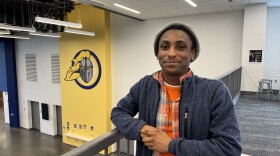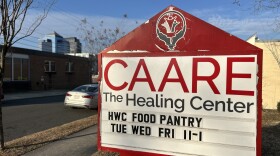Mykal Slack grew up in rural Georgia in an enormous extended family of aunts, uncles and cousins. He was raised as a girl — the sex on his birth certificate — but from a young age he remembers crafting imaginary worlds in which he had a boy’s name.
He grew up against the backdrop of a Southern, Christian landscape, but religion did not play a big role in his childhood. However, one morning when Slack was in college, he woke up with a thought that surprised him and his friends: he wanted to find a church home. Slack later followed this desire all the way to seminary. During his religious education he went through another awakening and told his seminary community he identifies as transgender.
Slack is now a minister living in Durham. He is also an advocate for LGBTQ rights and inclusion in spiritual spaces. Host Frank Stasio speaks with Slack, co-director of the Freedom Center for Social Justice and the community minister for Black Lives of Unitarian Universalism.
INTERVIEW HIGHLIGHTS
On his close relationship with his grandmother:
She was a deeply faithful person. She didn’t talk about church much but she talked about her faith quite a bit. There’s one thing that she often said that has stuck with me. She would say: “The best way to love God is to love yourself, love the people around you and love the earth” … There was something about that that stuck with me. She was such a beautiful person and loved us so hard.
On growing up amongst family members with albinism, including his mom:
We were always very clear about who we were, but I remember growing up there were a number of kids especially in elementary school and middle school who would fight with me [saying] “you’re mom’s white.” It’s like, “actually she’s not, she albino” … It goes to show how little we know about race and about the color of people’s skin and about what that looks like and means and how we talk about those things.
On his own relationship with his gender:
My relationship with my gender was deeply personal, and from the time I was very, very small I knew that it had to be. I knew that there were perceptions of who I was. I was assigned a gender at birth based on how I looked when I came out of the womb. And folk of course make all kinds of assumptions based on that.
On dreaming of living as another gender:
I used to have little dreamings and visions of myself as a little boy growing up … I was probably five or six … I imagined growing up into the man I was supposed to be. And I would name myself Michael or Brandon or whatever, and I would have a girlfriend, I would have a career doing all kinds of things. These were my imaginings. And I knew as long as I could hold that for myself, then I was gonna be OK. I managed to convince myself, if I could hold on to my own truth, it was OK if other people had another idea.
On building an inclusive spiritual community in Durham called The Clearing:
When LeLaina and I got here — LeLaina is my spouse — we knew that we wanted something different from a spiritual community. We wanted a place that centered on queer and trans people of color. We wanted a space that that not hierarchical, a space that really did church differently … So we endeavored to build The Clearing which is a new spiritual community.












